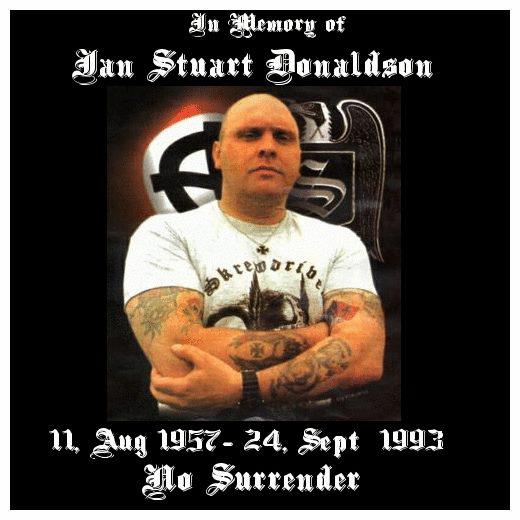A black teenage farm worker has been acquitted of murdering Eugene Terreblanche, South Africa’s far-Right leader in a case that has polarised racial groups in the country.
Patrick Ndlovu, who was 15 at the time of the killing, confessed his role in
the crime to police but a lack of forensic evidence and a failure by
detectives to treat him as a minor saw a judge rule in his favour.
However a second man, farm worker Chris Mahlangu, 29, was found guilty of
murder, attempted robbery and housebreaking.
During the day, as the verdict was read out at a court in the farming town of
Ventersdorp, there were clashes between hundreds of uniform-clad white
supremacist groups and local supporters of the two defendants which were
broken up by riot police wielding batons and shields.
Mr Terreblanche rose to prominence in the 1980s with angry speeches calling
for a separate Boer nation. He was beaten to death with a machete and an
iron bar in the bedroom of his farmhouse in April 2010, shortly before South
Africa hosted the World Cup. Following his death, Mr Ndlovu and Mr
Mahlangu handed themselves in to police. Mr Terreblanche was found lying on
his bed, with deep wounds to his head and body. His trousers were undone and
his genitals exposed and blood covered the walls and floors of the room.
Mr Mahlangu claimed that he had killed Mr Terreblanche in self-defence after
the rightwinger sexually assaulted him.
Judge John Horn dismissed the suggestion, along with others that Mr
Terreblanche was killed because of his political views. “There was no
conspiracy, no political intrigue, no racial undertones and no hidden
agenda,” he told the packed courtroom.
Judge Horn said there was no forensic evidence linking Mr Ndlovu to the scene, despite the fact that Mr Mahlangu was covered in blood spatters. He said that because the teenager, now 18, was also deprived of sleep and proper counsel by police, he would give him the “benefit of the doubt".
His decision provoked the ire of Mr Terreblanche’s family and supporters.
Andre Nienaber, Mr Terreblanche’s nephew, said they were “disappointed” by the judge’s decision not to convict both men.
“He was with the older one the whole time so I cannot believe he was not involved,” he said. “There were two murder weapons so there must have been two murderers.”
Mr Nienaber said that the fight for a separate nation for Afrikaners would continue despite Mr Terreblanche’s death. He warned of potential violent protests at the murders of white farmers which have claimed more than 3,000 lives since the advent of democracy in South Africa in 1994.
“There will be repercussions for sure – some people feel much more strongly about this than us so we will see what happens,” he said.
“What’s sure is that this has not left us leaderless. We have leaders and this is not the end. Our battle will stop when our coffins are in the ground.”
Mr Mahlangu spoke briefly to reporters afterwards to say that there was little difference between prison and the conditions he had been living in on the farm, but that he was “sorry” for killing Mr Terreblanche. The court heard previously that Mr Terreblanche paid the two men less than the minimum wage and sometimes replaced their wages with alcohol.
Mr Mahlangu will be sentenced on June 18, along with Mr Ndlovu, who was convicted of a minor charge of housebreaking with intent to steal at Mr Terreblanche’s farm.
Judge Horn said there was no forensic evidence linking Mr Ndlovu to the scene, despite the fact that Mr Mahlangu was covered in blood spatters. He said that because the teenager, now 18, was also deprived of sleep and proper counsel by police, he would give him the “benefit of the doubt".
His decision provoked the ire of Mr Terreblanche’s family and supporters.
Andre Nienaber, Mr Terreblanche’s nephew, said they were “disappointed” by the judge’s decision not to convict both men.
“He was with the older one the whole time so I cannot believe he was not involved,” he said. “There were two murder weapons so there must have been two murderers.”
Mr Nienaber said that the fight for a separate nation for Afrikaners would continue despite Mr Terreblanche’s death. He warned of potential violent protests at the murders of white farmers which have claimed more than 3,000 lives since the advent of democracy in South Africa in 1994.
“There will be repercussions for sure – some people feel much more strongly about this than us so we will see what happens,” he said.
“What’s sure is that this has not left us leaderless. We have leaders and this is not the end. Our battle will stop when our coffins are in the ground.”
Mr Mahlangu spoke briefly to reporters afterwards to say that there was little difference between prison and the conditions he had been living in on the farm, but that he was “sorry” for killing Mr Terreblanche. The court heard previously that Mr Terreblanche paid the two men less than the minimum wage and sometimes replaced their wages with alcohol.
Mr Mahlangu will be sentenced on June 18, along with Mr Ndlovu, who was convicted of a minor charge of housebreaking with intent to steal at Mr Terreblanche’s farm.

No comments:
Post a Comment